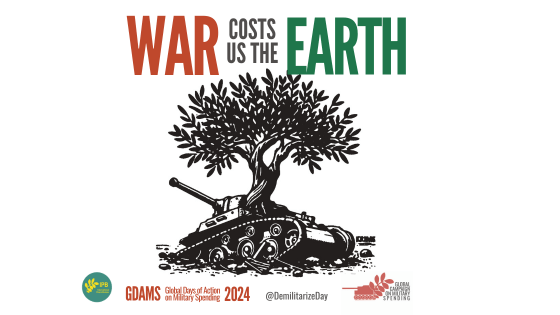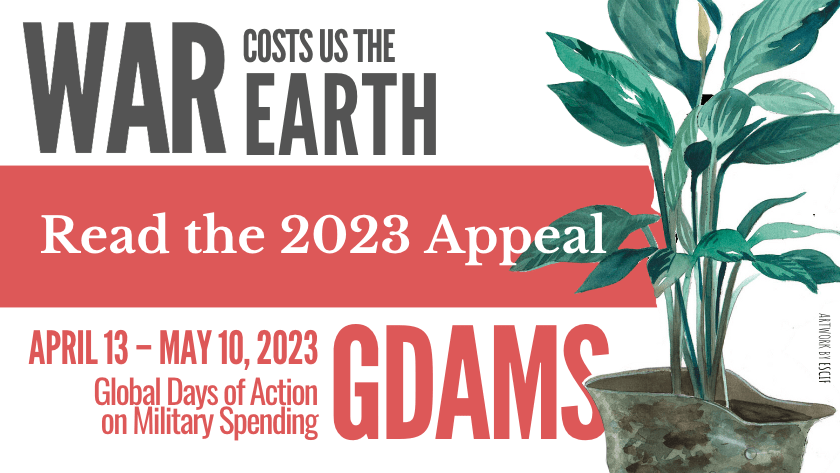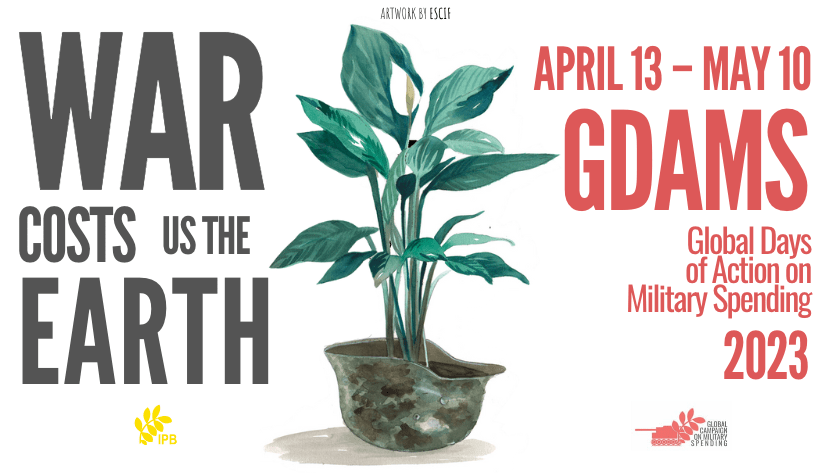The world’s militaries are responsible for roughly five percent of global Greenhouse Gas emissions, however, their carbon footprint, as well as the various other ways that they contribute to climate breakdown, are rarely scrutinized. Our governments currently spend more than US$2 trillion on militarization, but military expansion is inconsistent with efforts to reach essential emissions targets and will exacerbate, not stem, the climate emergency. War and armed conflict lead, not only to death and destruction but also to environmental devastation and climate breakdown. Although our governments may argue that such “defense” spending is necessary, it will ultimately render us defenseless in the face of the existential threat posed by the climate crisis.
Global heating poses a major and sustained risk to our planet’s climatic cycles and the resultant weather-related disasters often exacerbate existing injustices – and this can lead to conflict for access to land and basic resources, as well as forced displacement. Tackling Climate change must involve dealing with other structural problems such as poverty, economic shocks, and weakened institutions. This is particularly true in regions that have contributed the least to the climate crisis, yet are impacted the most by its devastating consequences.
As well as their carbon footprint, the world’s military structures also contribute to the climate crisis in other key ways:
- Crucially, military spending diverts resources away from essential environmental and social spending, including initiatives to slow the speed of climate change, deal with loss and damage, and respond to weather emergencies.
- Military structures in the form of national armies, militarized police forces, or private security companies are often deployed to protect the fossil fuel industry. This sector is one of the largest producers of GHG and military protection of it makes it complicit in these emissions.
- Although we urgently need to protect our ecosystems from environmental destruction, all too often when environmental activists take steps to safeguard their lands, rivers and seas, they are violently repressed by militarized security structures including the police, private security companies, and, at times, the army.
- The nexus between fossil fuel and extractivism, and armed conflict and war is well documented, from the colonial period to the wars of today.
- More and more people are being forced from their homes due to extreme weather events brought about by climate change. In the same way that the border security apparatus currently contains people and stops them from reaching safety or seeking asylum, the military will likely be further deployed to keep out those fleeing climate-related disasters.
- Moreover, the arms industry, which in many ways is the backbone of militarism, invests significant time and finance in corporate lobbying to advance its own profit-driven agenda. In recent years it has used the climate crisis as an opportunity to position itself as a key player in designing ‘greener’ weapons and has lobbied for more funding to be earmarked for that purpose. This approach prolongs and deepens the logic that drives militarism and war.
Political leadership has focused on hawkish politics and saber-rattling, stoking tension and fear, instead of cultivating international relations based on mutual trust, diplomacy, and cooperation – three components that are essential to tackle the global nature of the climate threat. Funds that could be used to mitigate or reverse climate breakdown, and to promote peaceful conflict transformation, disarmament, and global justice initiatives, are instead being spent on militarizing an already over-militarised world.
We urgently call on governments to:
- Change course and focus on rapid, deep cuts to military spending, driving an arms race and fuelling war;
- Demilitarize public policy, including policies designed to tackle the climate crisis;
- Implement human and common-security-centered policies that protect people and the planet and not the profit-driven agenda of the arms and fossil fuel industries;
- Create governance structures and alliances based on mutual trust and understanding, cooperation, and true diplomacy, where conflict is resolved through dialogue, not war.
The opportunity cost of doing otherwise just can’t get any higher.
War costs us the Earth.
You can read the full statement as a PDF attachment by clicking here.
Your organization can endorse it through this form on Action Network.
Don’t forget to engage with the campaign on Social Media – follow us on Twitter, Instagram, and Facebook.



